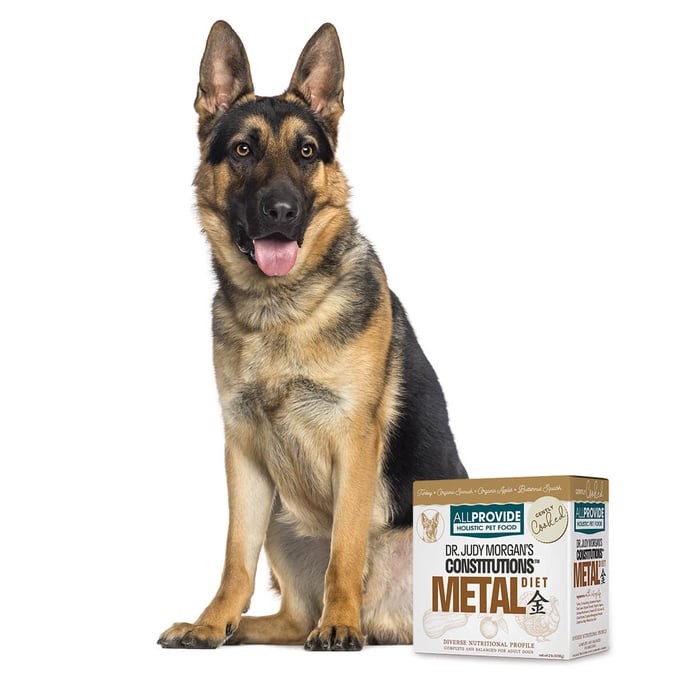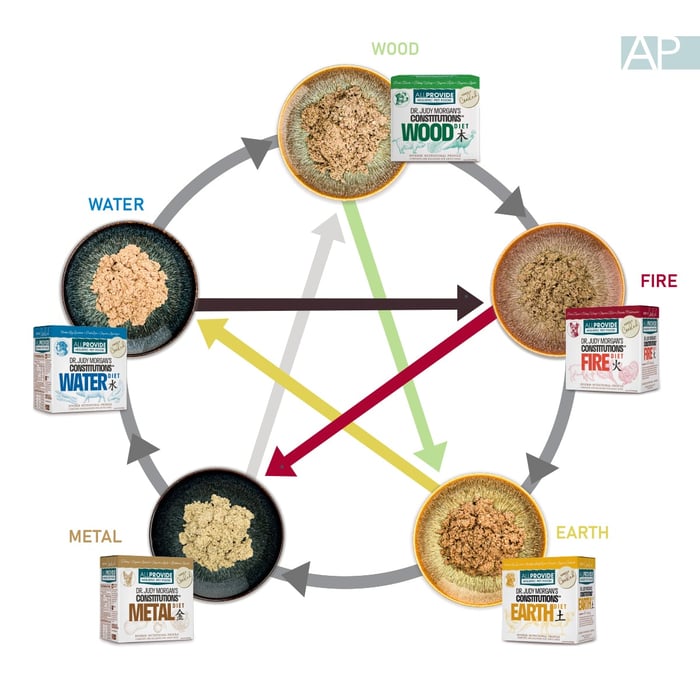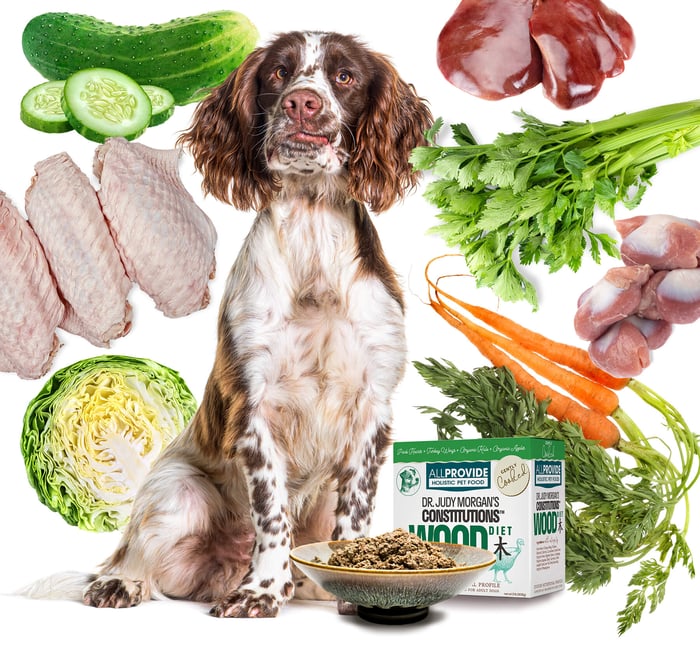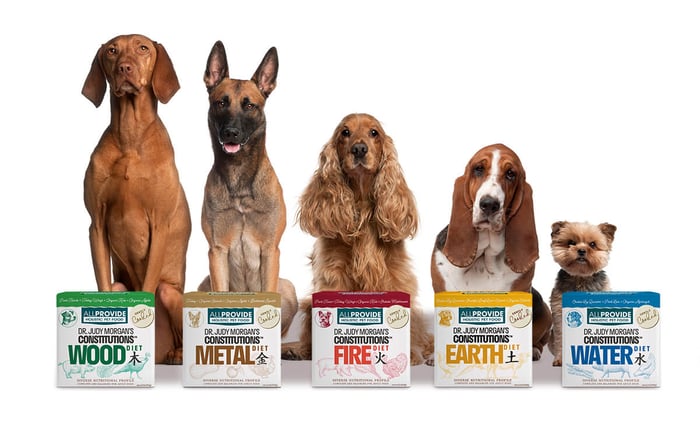 The Five Elements that Describe the ‘Constitution’ of a Dog
The Five Elements that Describe the ‘Constitution’ of a Dog
 The Five Elements that Describe the ‘Constitution’ of a Dog
The Five Elements that Describe the ‘Constitution’ of a DogFood therapy under the principles of TCVM—Traditional Chinese Veterinary Medicine is a system of classification called the Five Elements: Metal, Water, Wood, Fire, and Earth. Each element is associated with organs, colors, tastes, and food energetics. Categories include personality traits, physical body, behaviors, and predispositions. The categories are seemingly limitless. The five elements can be used to describe the ‘constitution’ of a dog. The constitution of a dog includes genetic strengths and weaknesses, which are expressed both physically and emotionally. Temperament is passed on genetically as well as physical characteristics. This classification provides a framework that aids one in making food choices for their pets that will most benefit them at a given time. By understanding which element represents your pet’s constitution, we can recommend diets that support the deficient element or counteract an excess element to restore balance. Feed based on your dog's element— it can aid in restoring balance and maintaining proper health, and is highly beneficial to your pet’s overall well-being.
The Five Element's Key Components
We have 2 categories we examine your dog— A Personality Assessment and An Excess-Deficiency Assessment. Elements are divided into several key components that encompass both genetic strengths and weaknesses of the type of breed influencing their physical and emotional traits:
1. PERSONALITY ASSESSMENT
Genetic Heritage
Breed Characteristics: Different breeds have specific traits, such as size, coat type, and temperament.
Health Predispositions: Mixed-breed dogs may exhibit fewer inherited health issues, benefiting from diverse gene pools. Awareness of hereditary conditions that can affect longevity and quality of life.
Physical Traits
Structure: Body weight, bone density, muscle and fat, and overall health.
Coat Quality: Skin health, shedding, and temperature regulation.
Health Predispositions: Certain breeds are prone to specific conditions (e.g., hip dysplasia in large breeds and respiratory issues in brachycephalic breeds).
Temperament
Behavioral Traits: Genetic predispositions can affect sociability, trainability, and energy levels.
Emotional Resilience: Some breeds are naturally more adaptable to stress, while others may be more sensitive or anxious.
Cognitive Abilities
Intelligence: Some breeds are known for their problem-solving skills and ability to learn commands quickly.
Instinctual Behaviors: Hunting, herding, or guarding instincts can be strong in certain breeds, influencing their behavior and training needs.
Age and Development Stage
Puppy vs. Adult Traits: Puppies may exhibit playful, energetic traits, while older dogs might show signs of wisdom or health decline.
Life Stage Needs: Different ages require different care strategies.
2. EXCESS AND DEFICIENCY ASSESMENT
Predisposed Health Concerns, Behaviors and Sensitives
Identifying potential health issues and behaviors based on an element’s characteristics.
An Excessive or Deficient Symptom
A pet can get out of balance. An element can manifest symptoms of excess or deficiency that correspond to changes.
Health Issues
Recognizing specific health issues tied to an element’s constitution and predispositions can help in early intervention and food therapy management, ensuring a better quality of life for dogs.
Understanding these symptoms helps assess and manage dogs’ health and behavior. Monitoring changes in physical traits or behaviors can indicate a shift in balance within their elemental constitution, guiding appropriate interventions, whether dietary, environmental, or lifestyle-based.
![]()
Identifying Your Pet’s Element
We recommend starting with determining your dog’s personality traits with a questionnaire that describes your pet in a series of categories. This will help identify ingredients, recipes, and Constitution Diet that best suits their needs. Dr. Judy Morgan’s personality quiz will help you evaluate your pet’s issues and examine symptoms of excesses and deficiencies to recommend the best food choice(s) to support your pet’s balance. To learn more about pairing your dog’s profile to their element and our recommended Constitution Diet, visit AllProvide Pet Personality Quiz
Once your pet’s profile is identified, one or several Constitution Diets can serve that specific pet’s needs.
Five Pet Profiles — Personality and Health Traits
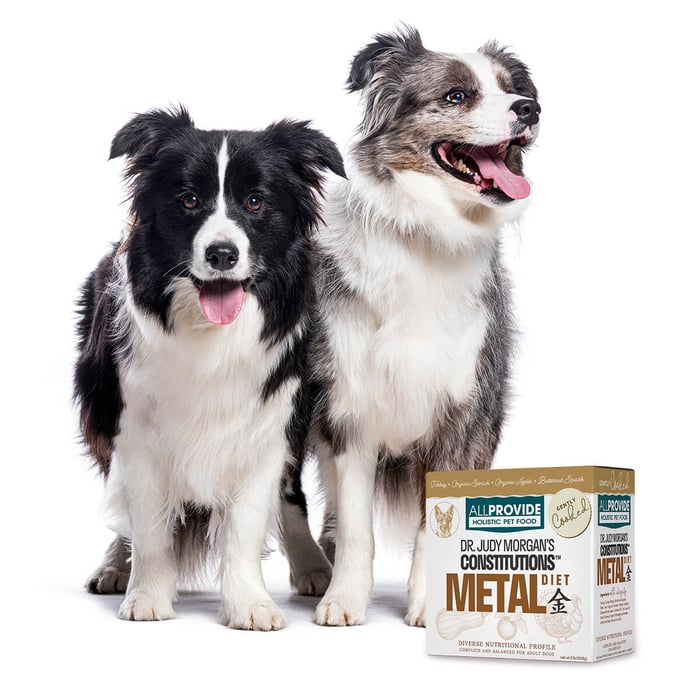
METAL DOG
The Guardian: Brilliant, disciplined, easy to train but rigid in nature, determined, organized, confident, independent, calm with a clear mind, obedient, reserved but loyal, easily rattled by noise and lack of order, stable and dependable. They can’t think outside the box, are usually in the middle of the pecking order, and love to be an only pet. When they are with a group of dogs, they will often be the leader but will follow the rules.
When the metal element is deficient, they may be unable to form lasting bonds. Sometimes, there’s a feeling pet parents can’t quite ‘connect’ with these dogs. Metal dogs often tend to lie down on their own somewhere and become relatively isolated. This hard-driving, intelligent, talented dog has sensitive needs that are usually hidden.
An excess of the metal element leads to inflexibility and a strong need to control things.
Breeds: Border Collie, German Shepherd, Siberian Husky, Akita, Doberman Pinscher, Chow Chow, Boxer, Weimaraner, Rottweiler
Physical Characteristics: lean, muscular build, broad chest, strong or structured posture. Their coats are often shiny and healthy, corresponding to their strong constitution. They have good vision and a sense of smell.
Organs: Lungs and Large Intestines
Health Predispositions: Metal dogs are commonly prone to respiratory system issues. Dogs of this constitution often have lung problems and may have asthma symptoms, cough regularly, or reverse sneeze. They are also prone to dry skin, rashes, sinus problems, and bowel irregularities.
The Aging Metal Dog: Needs a purpose. They need an exciting, rewarding, purposeful challenge to keep them mentally and physically alert. Pay close attention to environmental factors affecting the respiratory and immune system. Their powerful nose may be the only sense they rely on in their elder years.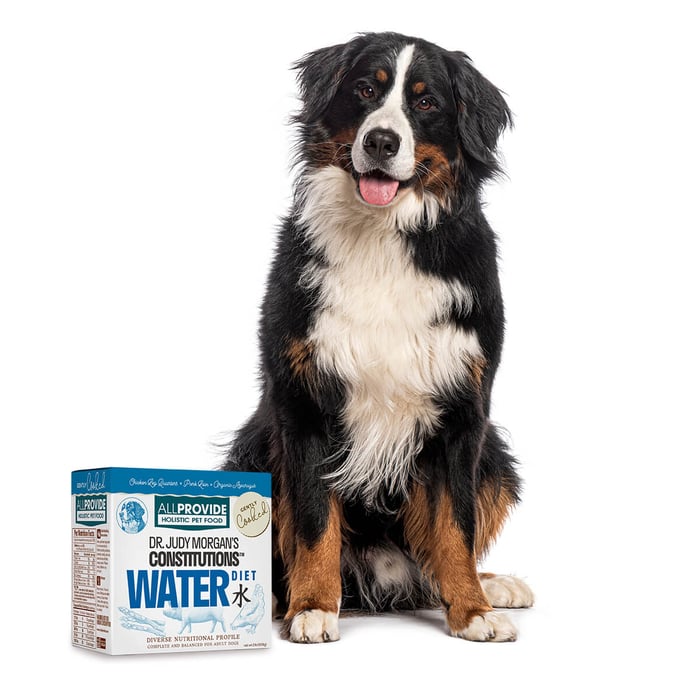 WATER DOG
WATER DOG
The Empath: Deep, devoted, intelligent, teaming with wisdom and sensitivity, intuitive, unpredictable, playful, curious, but with little confidence. They’re emotional beings and also extremely sensitive to our emotions. They can bite when afraid and sometimes roll over and/or pee when approached. They’re usually submissive to other animals in the pack or herd. Runt of the litter. Water dogs tend to be fearful of strangers, both humans and other animals. But they teach us to trust and are often called our spiritual teachers. Water dogs learn best when they have a deep and intimate connection with their human. They are known to be flexible and adaptable to changing circumstances. The water dog embodies water traits: the love for water or swimming.
When the water element is deficient, they may experience dulled vision and hearing, frequent urination, and osteoporosis. These dogs can be introverted, fearful, shy, and easily discouraged. Their emotional reflex is fear. They can be calm for one moment and go into full-blown panic the next. Deficiency of the water element can also lead to behavior problems such as fear biting. Water-type dogs can sometimes be prone to depression.
If the water element is excessive, they can be lethargic, have digestive issues, urinary retention, arthritis, joint health concerns, stubborn, aloofness, and difficulty training.
Breeds: Labrador Retriever, Saint Bernard, Newfoundland, Standard Poodle, Bernese Mountain Dog, Chesapeake Bay Retriever, Irish Water Spaniel, Great Dane, Portuguese Water Dog, American Water Spaniel
Physical Characteristics: Sleek, lean, middle-sized body, athletic physique, graceful and agile body, and soft, shiny appearance. Their coats can be more prone to having a water-repellent quality.
Organs: Kidneys and Bladder
Health Predispositions: Water dogs are prone to urinary incontinence, hind leg and lower back pain, need kidney and nervous system support. They can be prone to kidney issues, bladder infections, and weak lower backs and hind ends. Water dogs often have mysterious ailments and injuries that come and go or may not be easily diagnosed by or respond to conventional medicine.
The Aging Water Dog: Needs peace and a calm environment. These dogs need to feel quiet and peaceful as they age and have a deep connection and devotion to their pet parent. They prefer to be right by your side if they can be.
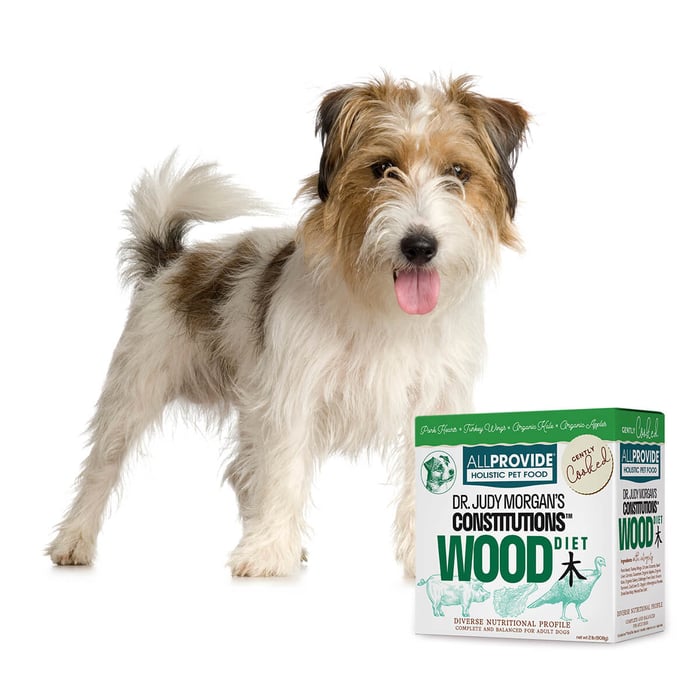
WOOD DOG
The Sargent: Alphas in the herd, leaders, high energy and drive, competitive, confident, active, athletic, alert, aware, fast-moving, have high stamina, and respond quickly to stimulus. The wood dogs are superstar performers but are sensitive to stress and tend to be aggressive and impatient. They are quite agile and love challenges, variety, speed, and movement. They are unflinching under pressure and will take charge if they see a weakness or an opening.
When the wood element is deficient, dogs can become easily angered and irritable, suffer from low self-confidence, becoming easily dominated.
When the wood element is excessive, wood dogs need clear boundaries from their pet parents. Being clear, consistent, and firm will easily earn respect from a wood dog. However, they will test us regularly just to be sure someone is in charge.
Breeds: Belgium Malinois, Jack Russell Terrier, Husky, Malamute, Cocker Spaniel, Springer Spaniel
Physical Characteristics: sleek, thin body, either tall or short, large eyes
Organs: Liver and Gall Bladder
Health Predispositions: On a physical level, the most important health need for the wood dog is movement. The common ailments and body parts affected by imbalances in which movement can both aid or hinder the wood dog are tendon and ligament injuries, muscle soreness, muscle tension, stiffness, swelling, aches and pains in joints, sluggishness, and lethargy. Wood dogs are prone to liver disease and allergies. They can often have eye, foot, and nail problems. Wood dogs are also prone to digestive issues and will vomit bile more often than other types.
The Aging Wood Dog: Needs enrichment activities. These dogs need to be gently engaged as they are unhappy with limitations in their aging bodies and tend to get frustrated and grumpy. Avoid physical pain by continued senior support of acupressure and massages, diet supporting their joints and livers, and mental stimulation to compensate for their slower movements.
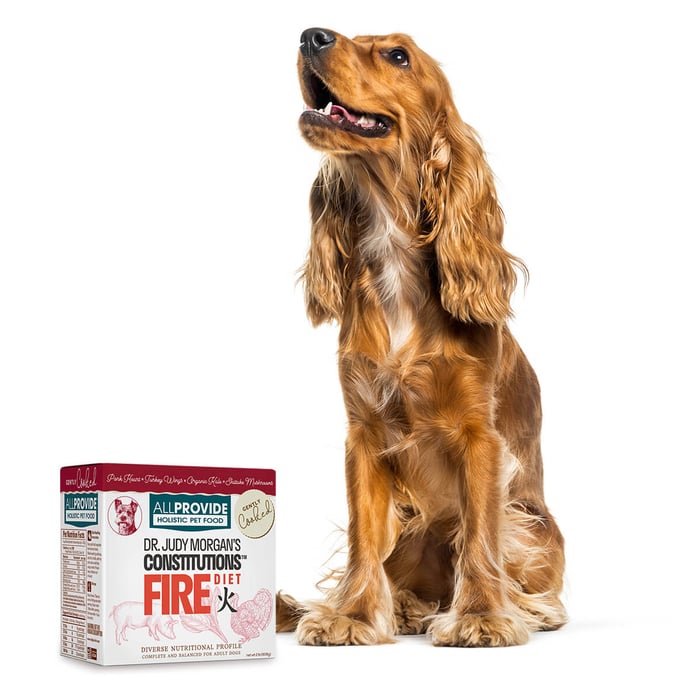
FIRE DOG
The Emperor: Friendly, outgoing, social, loves attention, affectionate, charismatic, hyper-excitable, difficult to calm down, classic extrovert, playful, full of energy, outgoing, and vocal. They’re inquisitive with strangers, love to be adored, like to bark, and are always moving. The fire dog has a short attention span, is more emotionally sensitive than any other elemental dog, and may react strongly to scolding or negative emotions.
Fire dogs thrive on both physical and emotional contact, which is as essential to them as food. They are naturally cuddly and are adept at both giving and receiving affection. When the fire element is deficient in their sociable natures, they can suffer from separation anxiety, overstimulation, and even exhibit dramatic behaviors.
If the fire element is excessive, they can suffer from overheating, panting, excessive thirst, heart and skin issues, insomnia, and can be overly restless.
Breeds: Chihuahua, Pomeranian, Papillon, Cavalier King Charles Spaniel, Spaniels, Jack Russell Terrier, Miniature Pinscher, Yorkshire Terrier, Italian Greyhound, Pekingese ShihTzu, Staffordshire Bull Terrier
Physical Characteristics: Small head, strong body, and small bright eyes. They are very fast but don’t have a lot of stamina. Their skin tends to be quite pink underneath their fur.
Organs: Heart and Small Intestine
Health Predispositions: Fire dogs may have imbalances of excess heat inside and outside their bodies. They may have stomach/gut issues, allergies, swollen joints, thirst, dry cough, itchiness, and skin issues. They also may be prone to heart conditions and disease.
The Aging Fire Dog: Needs attention and adoration. Fire dogs love short walks where they can gather attention and feel loved. Include them in your social life, and monitor their environmental temperatures by giving them cool places to be outside in the summer heat. Watch for allergic flair-ups, and have regular vet checks for their big hearts.
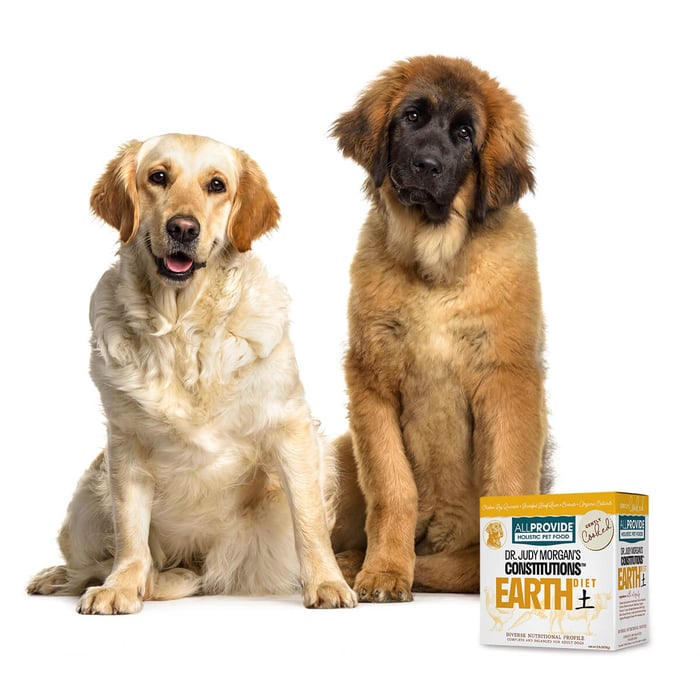
EARTH DOG
The Caregiver: Kind, gentle, nurturing, chubby, easy-going, extremely friendly but lazy, laid back, and slow. They have an excellent memory but could be more quick thinkers. The earth dog loves everyone, loves to be touched and petted, seeks comfort, enjoys sleeping and eating, and is eager to please. They’re great therapy dogs and are routine-based. Earth dogs can be stubborn; however, they’re food-motivated. They gain weight by simply looking at food - it’s their most excellent motivator, but regular exercise and a suitably satisfying diet will help with their propensity.
An earth dog may be over-protective, possessive, or territorial if the earth element is excessive. They may become gluttonous, lethargic, prone to obesity, and abnormal appetite. They’re prone to dampness and weakness in the lower body, hips, and hind legs. If the earth element is deficient, it can manifest as fearfulness or anxiety, leading to poor appetite and digestive issues such as diarrhea or irregular bowel movements.
Breeds: Golden Retriever, Labrador, Bulldog, Basset Hound, Beagle, Newfoundland, Cocker Spaniel
Physical Characteristics: A sturdy, broad and robust build, round features, dense or thick fur, large, strong heads and jaws. A good example is: The color of earth is yellow so a large, laid back yellow Labrador fits this element perfectly.
Organs: Spleen and Stomach
Health Predispositions: Earth dogs may have poor muscle tone, gastrointestinal issues, diarrhea, obesity, and food allergies. They’re also prone to loose teeth, weak joints and back, swelling in the abdomen, hips, hind legs, and swollen lymph nodes.
The Aging Earth Dog: Maintaining a balanced energy and a nutrient-rich proper diet is crucial. The appropriate diet is needed to keep an adequate weight for the age-related decrease in physical exercise. An earth dog needs to be with their humans and have a peaceful, reassuring atmosphere with little change. They like to have company. Cats and other dogs also give them comfort and help them feed their nurturing spirit.
SUMMARY
Feed Based on Your Dog's Element
By understanding which element represents your pet’s constitution, we can recommend diets that support the deficient element or counteract an excess element to restore balance. Restoring and maintaining balance among these elements is vital to your pet’s optimal health and well-being. Feed based on their specific needs and purpose. Our Gently Cooked Dr. Judy Morgan’s Constitution Diets are five uniquely crafted recipes with a distinct set of carefully selected ingredients that aid in restoring, balancing, and maintaining proper health, targeted for a pet’s specific needs. While there’s no one-size-fits-all approach, the key with TCVM is to tailor your pet’s diet at a given time and rotate to fit their unique nutritional demands.
⭐️ Order Dr. Judy Morgan's Constitution Diets or any of our recipes today! Visit www.allprovide.com

